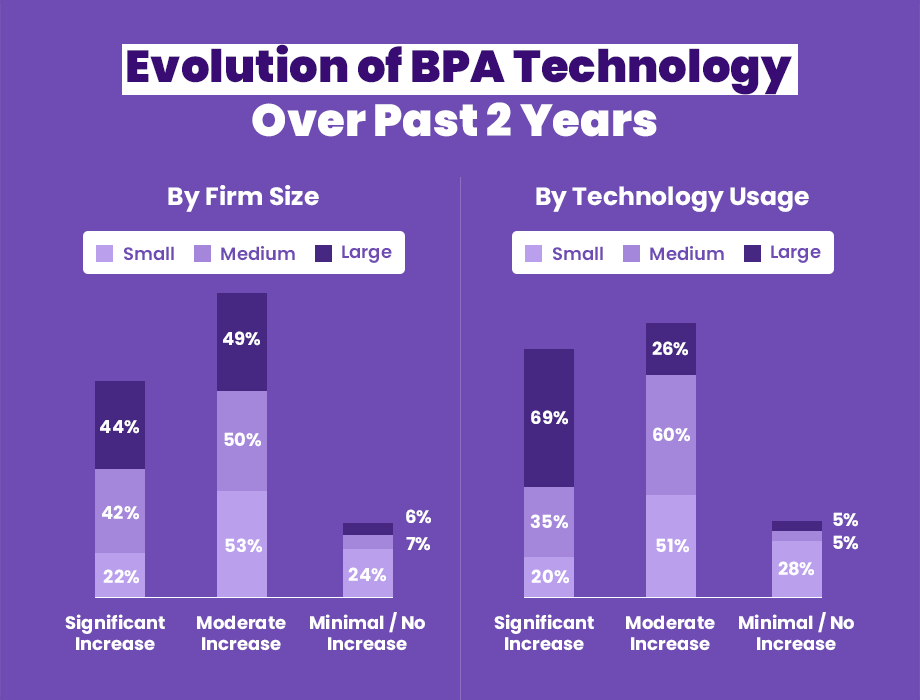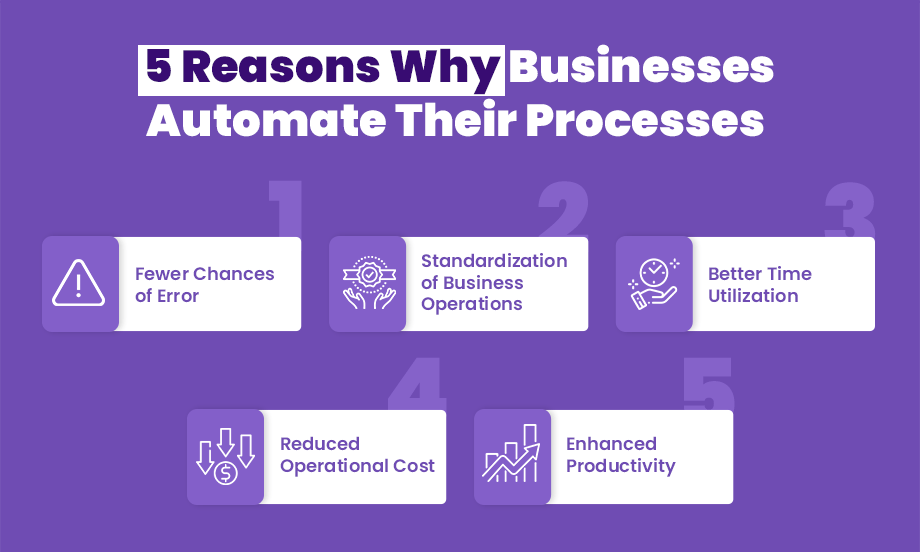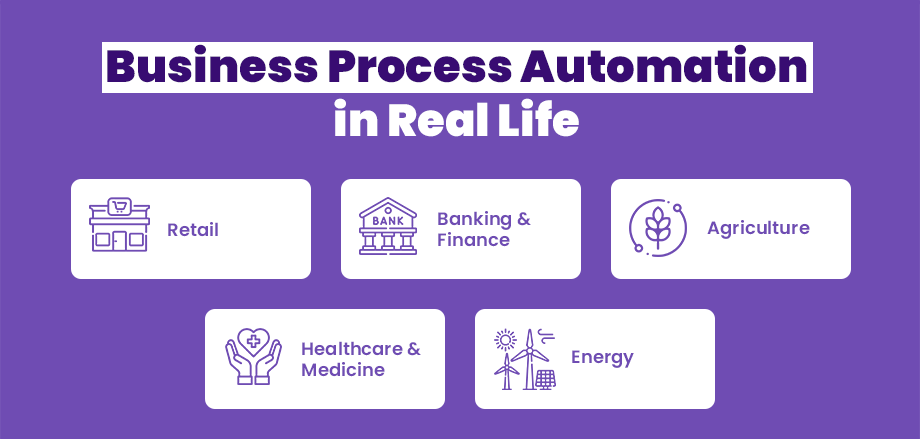
Complete Guide to Business Process Automation: Benefits + Examples from Industry
Business expansion is essential for long term success and growth.
However, this is easier said than done, as expanding a business brings various new challenges and risks.

One of the most prominent challenges a business faces is managing diversified business operations and maintaining efficiency. However, it is commonly known that manually managing operations at a large scale usually results in compromised efficiency.
This is where the scope of BPA (Business Process Automation) comes into the scenario. Owing to the latest technological advancements and innovations, it is now possible to automate various business operations processes and, therefore, increase business scalability.
However, Business process automation is way more than just automating processes. Let's find out what the fundamentals of BPA are in the upcoming section.
What is Business Process Automation?

Source: Digital Sky Net
As the name suggests, business process automation is the process of automating business operations by utilizing the latest technologies and digital platforms. Even though the concept of BPA is relatively new, it has gained massive popularity in various business sectors already.
Simply stated, BPA enables businesses to escape the monotony of work and increase their efficiency by automating various processes. In the present time, the scope of implementing BPA processes varies from simple tasks to even advanced ones, making it a worthy investment.
To elaborate, there are generally two types of business processes that can be automated: core functions and supporting functions. The core functions are a business's key revenue-generating activities and therefore form an essential part of its operations. On the other hand, supporting functions are all the processes that act as auxiliary to the core functions in revenue generation.
Generally, it is the business owner that has to determine which functions they need to automate and up to what extent. The decision is made on the basis of a business's scale, budget, and requirements. While some businesses have implemented BPA technology in a few of its processes, there are also examples its of 360-degree implementation.
Now that you are aware of what business process automation is, it is time that we discuss how it can be beneficial for a business to automate their operations.
Why Do Businesses Automate Their Processes?

Fewer Chances of Error
It is commonly known that conducting processes manually increases the chances of human error. This is especially the case in large-scale business operations. Moreover, some of the business processes require high preciseness, and an error in them can turn out to be a threat to the business.
However, by automating business processes and letting the machines and technology do the work, one can eliminate the chances of an error occurring in the process.
Speaking factually, BPA processes are better known for their preciseness and accuracy, especially when integrated with Artificial intelligence and Big Data. Therefore, integrating BPA technology is highly feasible for businesses where precision is essential.
Standardization of Business Operations
Standardization is the key to generating uniform results and has become an essential factor in certain businesses. Today, there is an increase in the number of businesses looking to deliver standardized services to their customers and provide them with a consistently excellent experience.
BPA strategies deliver up to these needs of process standardization and are well known for the same. Machines and technology have the ability to work on a monotonous process over and over again and deliver consistent results. The workflow, steps, plan, and performance generated by BPA technologies are exactly the same, and therefore, so are the outputs.
Better Time Utilization
As businesses are increasing in scope and size, it is getting more and more difficult for employees to utilize their time efficiently. Moreover, employees spend a significant amount of time on non-work-related activities that decrease their productivity. Speaking factually, an average employee spends more than 2 hours every day just on administrative tasks.
However, it is possible to cut short on this time by automating business processes. The latest technology is highly reliable, efficient, and generates precise results. As a result, when these less-important tasks are automatized, employees are left with more time to focus on more important tasks.
Reduced Operational Cost
Being inefficient and not managing your resources optimally can result in massive financial losses for a business. Moreover, a business may have to invest additionally to rectify these mistakes, causing further damage to the company's financial situation.
This is where the scope of automating business processes comes into the scenario. Business process automation reduces the business's need and reliability on human resources, therefore reducing the operational costs.
Moreover, one can save on revenue that would otherwise be lost owing to inefficient processes and human errors. Consequently, it is highly recommended for businesses to automate business operations.
Enhanced Productivity
It is commonly known that monotonous and repetitive tasks negatively impact employees' productivity and lower their output quality. Moreover, certain tasks are cumbersome to do and can be delegated without risk.
One can achieve this objective by automating tedious and monotonous tasks through business process automation. This implementation of business process automation gives employees more time to focus on more important tasks and eliminates monotony in the workplace, therefore maintaining employee morale.
Therefore, it is safe to say that a business that automates its processes in the right manner can benefit from more productive, motivated, and goal-oriented employees.
These were a few examples of how business process automation is useful for businesses. However, the scope of BPA extends way beyond this, and so does its implementation. Moving further, let's find out what are the different implementations of business process automation in corporates and businesses.
Examples of Business Process Automation

Retail
It is commonly known that the present-day retail businesses are burdened by increasing customer demand, complex supply chains, and shifting consumer trends. In this complex and unmanageable scenario, business process automation is gaining massive popularity to fill the retail sector's demands.
Retail businesses undertake numerous complex processes on an everyday basis. Therefore, there is an immense scope for process automation in the segment. Speaking factually, a large part of retail processes can be automated in the present time, owing to the latest operational efficiency of the businesses.
Some of the most common implementations of business process automation technology in the retail industry are to efficiently track inventory levels, understand customer buying patterns, manage payments, and more.
This automation of business processes is a highly efficient technique to enhance the quality of business operations and save on labor costs. Moreover, the overall business management is more precise, reliable, and auditable when automated. This, in turn, enhances the customer experience that a business delivers to its target market.
Banking & Finance
As the economies are growing, the burden on the banking and finance industry is increasing as well. Moreover, these industries are incredibly critical and require high preciseness. As a result, there is no space for human errors in the banking and finance industry.
However, by automating business processes, the businesses operating in this sector can generate accurate results and minimize their chances of human error. Companies in the banking and finance sector make use of robotic process automation, artificial intelligence, or even both to achieve the desired results.
The latest BPA solutions in the banking and finance sector enable safe storage of data, 360-degree automated processes, and efficient employee workflows. As a result, the industry has become less dependent on human efforts and is increasing its overall efficiency. Therefore, one can expect the banking and finance sector to be an ideal example of business process automation in real life.
Agriculture
Agriculture is a labor-intensive industry and requires numerous processes, which are done manually. This is because either the businesses in this industry are unaware of process automation solutions or are unable to find its implementations.
However, business process automation has numerous implementations in the agriculture industry. One of the major reasons to automate agriculture processes in agriculture is to reduce labor work and increase the overall efficiency of the process.
Some of the most prominent implementations of business process automation in agriculture are forecasting weather, analyzing soil condition, automating irrigation, determining harvest time, and more.
Automating these processes not only saves on human effort but also increases the overall efficiency of agriculture. As a result, a business benefits in the long term by integrating business automation practices.
Healthcare & Medicine
The global demand for good quality healthcare is rising. However, the healthcare industry is finding it challenging to provide healthcare services to a large group of people while also maintaining quality and standards.
This is where the role of process automation comes into the scenario. Owing to the latest BPA technologies and solutions, healthcare has become more accessible globally. In the present time, the majority of healthcare institutions have implemented process automation solutions in one way or the other.
One of the most prominent examples in this scenario is telemedicine, which aims to connect medicine practitioners and patients to connect with each other. Moreover, with other clinic management and patient management technologies like automated consultation booking, patient health monitoring, emergency and hazard management, and medicine administration solutions, healthcare services are becoming more efficient than ever.
Not just that, robotic surgery is also gaining massive popularity and is known for its preciseness, efficiency, and less risk factor as compared to traditional surgery. The scope of BPA in healthcare is increasing with every passing day and is increasing the industry's overall value.
Energy
In the present time, the demand for energy is increasing among other industries, sectors, businesses, and people. Consequently, the energy industry is finding it challenging to meet this growing demand, especially when most of the processes in this industry are done manually.
However, with process automation technology, there is a sudden shift in the paradigm of the energy industry. The latest technology enables businesses in this industry to supply energy faster and more efficiently and increase their profit. Moreover, eliminating repetitive processes and increasing employee productivity is now possible due to the vast potential of BPA technology.
Some of the most popular implementations of BPA solutions in the energy industry are top-notch equipment service, advanced disaster management, equipment repair alert, etc. Owing to this technology, the energy industry has become more efficient, safe, and profitable and is able to meet the increasing energy demands.
These were just a few instances where business process automation is implemented in different sectors. It would be safe to say that today, almost every industry can benefit from BPA. As a result, there are more and more businesses looking for BPA solutions for their industry. Therefore, let's find out how one can implement BPA solutions in their industry.
Looking for Business Process Automation Solutions?
BPA solutions are developed with high-end technologies like AI (Artificial Intelligence) and IoT (Internet of Things). Therefore, for a business process to be efficiently automated, it is necessary that we integrate it with UI technology such as mobile applications.
Since mobile apps are easy to use, highly user-friendly, and interactive, it is easy to utilize them for BPA solutions than any other technology.
Moreover, when we talk about mobile application development, there are two primary options to choose from. One can either develop a native app or a cross-platform one, depending upon their preferences, budget, and other factors.
In order to efficiently integrate BPA technologies with a mobile app, native app development is the ideal approach. This is because native apps have access to OS-level hardware, offer high-end performance and an excellent user experience. However, this isn't the case in cross-platform applications where one has to add third-party API plug-ins to get similar outcomes.
By developing a native mobile app for your BPA strategies, you can efficiently control your business remotely and with ease. This will allow you to gain maximum advantages out of BPA solutions.
The Bottom Line
Business Process Automation is the future of numerous industries and the businesses operating in them. This solution is technologically advanced, improves business efficiency, and enhances work productivity, therefore proving to be highly beneficial.
Moreover, in the present time, the implementation of BPA strategies has rapidly increased. Owing to this factor, businesses of all scales are automating their everyday operations to a large extent.
We are sure that this blog turned out to be helpful to you in understanding business process automation strategies, their benefits, implementation plan, and more. Now that you are aware of all these factors, you are all set to automate your business operations and increase your work efficiency in the long run.
Trending
-
1 SEO Mistakes That Could Be Costing Your Shopify Store Sales
Daniel Hall -
2 Strategies for Safeguarding Assets and Investments
Daniel Hall -
3 The Role of PR Firms in Crisis Management and Damage Control
Nitish Mathur -
4 How to Make Appealing Visuals for Your E-commerce Store
Daniel Hall -
5 The Competitive Landscape of Low-Cost Carriers in Belgium: TUI Fly Belgium’s Position
Daniel Hall





Comments